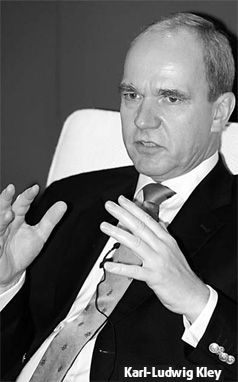German drug and chemical maker Merck KGaA is stepping up its investment in China and looking at more acquisitions to shore up growth even as it expects to cash in on the nation's medical reform plan, according to senior company officials.
"Encouraged by the impressive economic growth in China amid the global financial crisis, the company confirms the strategy and decision to be more aggressive in China and turn it into one of the pivots of our business," said Karl-Ludwig Kley, chairman of the Board, Merck KGaA.

The company will focus its investment in three major areas viz. research and development, acquisitions and stepping up production, Kley said.
The focus now is on clinical studies, which will see substantial amounts of investment, and catapult China as the R&D center of Merck worldwide.
There are also possibilities for mergers and acquisitions in China's pharmaceutical market, but we are reluctant to proceed for now, Kley said.
Compared with economic growth, what matters more for the company is the medical reform that China is committed to. The nation plans to invest US$124 billion to provide basic health coverage for majority of its 1.3 billion population by 2011, including the setting up of 29,000 community clinics.
"We are excited about it and are keenly following the government moves in this regard," said Howard Sui, managing director, Merck Serono China.
During the past three years, China's pharmaceutical market grew by 20 to 25 percent, while Merck's growth was much higher.
In 2007, Merck KGaA acquired Serono and set up the Merck Serono joint venture. That alliance has helped the company to grow its China business by nine to 10 times, said Sui.
During the first half of the year, Merck Serono reported sales of 2.62 billion euros globally, accounting for 69 percent of the company's total sales.
In 2008, the growth in China was over 50 percent, and in the years ahead, the growth could be sustained at 40 to 50 percent levels, although it is much more challenging, he said.
"This will not be a tough job after we introduce the 10 new drugs for which we have sought registration in China," said Sui.
Currently, the company sells 17 drugs in eight categories in China, including cardiovascular, fertility, neurodegenerative and oncology. The 10 new blockbuster drugs from the Merck's table are currently undergoing clinical trials, and are mainly for oncology, fertility and Parkinson's treatment.
Merck expects the new drugs to figure in the list drawn up under the healthcare reform plan, said Sui.
In August, China, announced the basic drug list that mostly included products from Chinese companies. It also had one Merck product Thyrozo for treating thyroid diseases. With an expanded list anticipated soon, it could see more sophisticated products from other foreign drug makers.
The company has also been rejigging its China strategy. Earlier, Merck was focused on cities and hospitals, but now, it is expanding to small and rural clinics, said Sui.
Excluding Japan, China is the largest market for Merck in the Asia-Pacific region, followed by India. But it is still quite small, accounting for just 5 percent of global sales. Kley, however, is confident that Chinese sales would grow in the next few years.
Hurt by the financial crisis, the pharmaceutical market in the United States and Europe continues to be sluggish, making China the most dazzling and attractive market worldwide.
IMS Health predicted China's drug market to expand at about 22 percent annually over the next five years. This is expected to make China the world's third largest pharmaceutical market by 2013 next to the US and Japan, valued at US$68 to US$78 billion. Now, it ranks the sixth, with a market size of US$24.5 billion.
Besides the pharmaceutical sector, chemicals will be another sector that Merck will focus on in China.
The company on Tuesday signed a chemical acquisition agreement with Jiangsu-based Taizhu Technology and Development Co, the largest pigment chemical producer in China.
Merck declined to elaborate on the volume of the deal, citing corporate confidentiality. Taizhu, set up in 1988, has annual sales of 14 million euros.
(China Daily September 10, 2009)